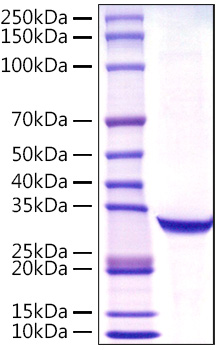Description
Recombinant Human PSA/KLK3 Protein
The Recombinant Human PSA/KLK3 Protein is a biologically active recombinant protein that plays a significant role in various cellular processes and signaling pathways in human biology. This protein is widely employed in immunological research, cell biology studies, protein-protein interaction analyses, and therapeutic development, providing researchers with a reliable tool for investigating PSA/KLK3 function and its implications in health and disease.
This product (SKU: RPCB1610) is produced using HEK293 cells and features a C-His tag for convenient detection and purification. The protein exhibits a calculated molecular weight of 27.68 kDa with an observed molecular weight of 30-32 kDa under denaturing conditions, achieving ≥ 95 % as determined by SDS-PAGE.. Functional bioactivity has been validated through rigorous quality control assays, confirming its suitability for demanding research applications.
Key Features
| High Purity by Affinity Chromatography | |
| Mammalian & Bacterial Expression Systems | |
| High lot-to-lot consistency via strict QC |
| Product Name: | Recombinant Human PSA/KLK3 Protein |
| SKU: | RPCB1610 |
| Size: | 10 μg , 20 μg , 50 μg , 100 μg |
| Reactivity: | Human |
| Synonyms: | APS, KLK2A1, PSA, hK3, KLK3, APS, prostate-specific antigen, KLK2A1, PSA, hK3 |
| Tag: | C-His |
| Expression Host: | HEK293 cells |
| Calculated MW: | 27.68 kDa |
| Observed MW: | 30-32 kDa |
| Gene ID: | 354 |
| Protein Description: | High quality, high purity and low endotoxin recombinant Recombinant Human PSA/KLK3 Protein (RPCB1610), tested reactivity in HEK293 cells and has been validated in SDS-PAGE.100% guaranteed. |
| Endotoxin: | < 0.1 EU/μg of the protein by LAL method. |
| Purity: | ≥ 95 % as determined by SDS-PAGE. |
| Formulation: | Lyophilized from a 0.22 μm filtered solution of PBS, pH 7.4. |
| Bio-Activity: | Measured by its ability to cleave the colorimetric peptide substrate, Succinyl-Arg-Pro-Tyr-p- Nitroanilide (Suc-RPY-pNA). The specific activity is >160 pmol/min/μg, as measured under the described conditions. |
| Reconstitution: | Centrifuge the vial before opening. Reconstitute to a concentration of 0.1-0.5 mg/mL in sterile distilled water. Avoid vortex or vigorously pipetting the protein. For long term storage, it is recommended to add a carrier protein or stablizer (e.g. 0.1% BSA, 5% HSA, 10% FBS or 5% Trehalose), and aliquot the reconstituted protein solution to minimize free-thaw cycles. |
| Storage: | Store at -20℃.Store the lyophilized protein at -20℃ to -80 ℃ up to 1 year from the date of receipt. After reconstitution, the protein solution is stable at -20℃ for 3 months, at 2-8℃ for up to 1 week. |
KLK3 (Kallikrein Related Peptidase 3) is a Protein Coding gene. The gene is one of the fifteen kallikrein subfamily members located in a cluster on chromosome 19. It encodes a single-chain glycoprotein, a protease that is synthesized in the epithelial cells of the prostate gland and is present in seminal plasma. KLK3, also known as Prostate Specific Antigen (PSA), kallikrein-related peptidase 3, Gamma-seminoprotein, is a secreted protein of the glandular kallikrein subfamily of serine proteases. KLK3 contains one peptidase S1 domain. KLK3 is a glycoprotein produced almost exclusively by the prostate gland. Growing evidence suggests that many kallikreins are implicated in carcinogenesis and some have potential as novel cancer and other disease biomarkers.







